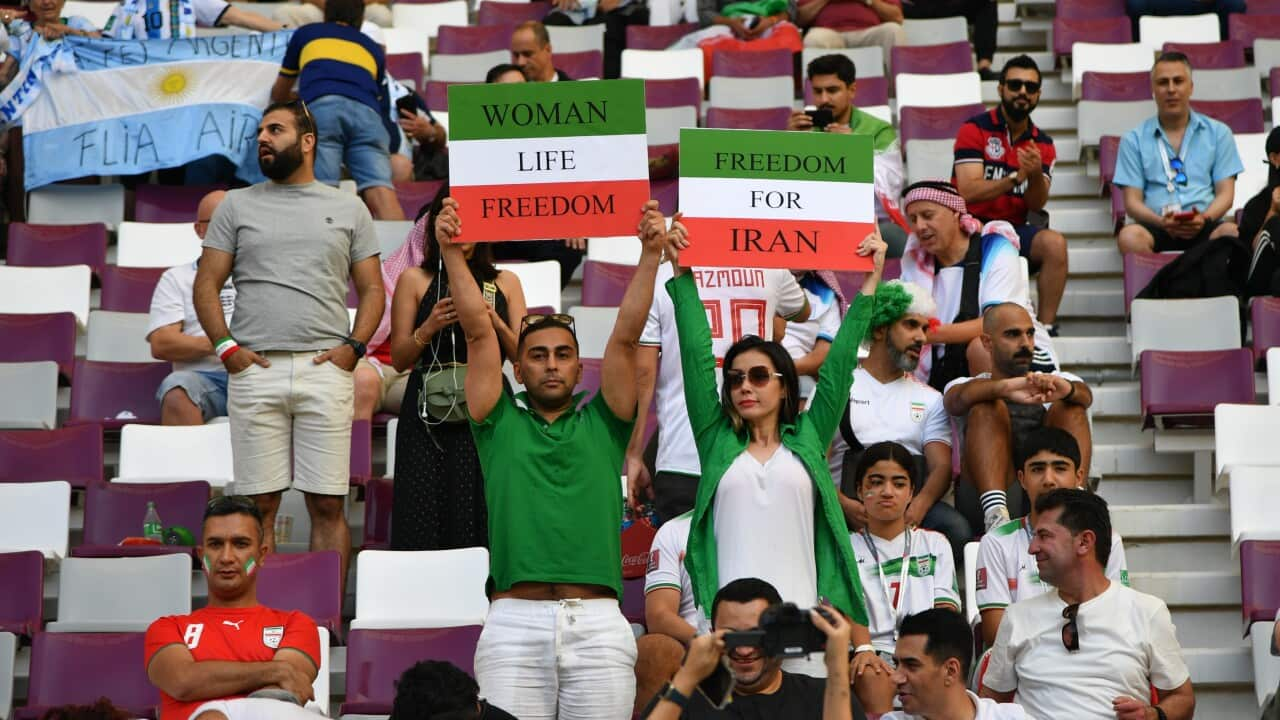Key Points
- Iran and the USA faced off against each other in a crucial World Cup clash on Wednesday morning (AEDT).
- Despite insisting they are out to play football, political tensions were already running high before kick-off.
- Iran and the US have a complex geopolitical history - and the match has triggered memories of their rivalry.
Two of the world’s most fierce geopolitical rivals have faced off in a football match that's been described as anything but just another World Cup clash.
In a fixture that has raised eyebrows and turned heads: Iran and the United States met in an all-important do-or-die match at the 2022 FIFA World Cup on Tuesday night (Wednesday 6am AEDT).
The two nations have been bitter enemies for 70 years, with fraught relations between their political leaders dissipating even further over the past few years.
But in arguably the most politically charged match of the World Cup this tournament, it's their representative football players who did the talking on the pitch - and millions were watching in anticipation.
The USA managed to fend off Iran to progress into the knockout tournament in a 1-0 win that has proved to be both a symbolic political win and a sense of pride for the country.
Tensions have run high and the game turned political before the players even stepped foot on the pitch. How did we get here?

Iran and USA football players shake hands prior to their 2022 FIFA World Cup match. Source: Getty / Marvin Ibo Guengoer
What's the issue between the United States and Iran?
The US and Iran have a long, complicated past that spans back to 1953 when Iran's prime minister Mohammad Mossadegh opted to nationalise the country's oil industry to benefit his people.
Fearful of oil's global supply and the potential rising costs, the US intelligence agency and the United Kingdom convinced the then-Shah to overthrow Mr Mossadegh from power.
Alam Saleh, lecturer in Iranian Studies at the Australian National University, said it was this stunt by the US that's remained "deeply rooted" in Iranian contemporary history.
Since then, several disputes between the two nations followed, particularly upon the fall of the Shah's rule in the 1979 Iranian revolution.
Dr Saleh said many revolutionaries at the time described Western-friendly Shah Mohammad Reza Pahlavi as an "American puppet".
After Mr Pahlavi travelled to the US to receive medical attention during the revolution, furious Iranian protesters stormed the US embassy in Tehran and held 52 staff members hostage for 444 days.
It prompted US President Jimmy Carter to sever all formal diplomatic, and political ties with Iran - and bilateral relations have remained tense.
Any glimmer of "diplomatic achievement" between the two countries came to rise in 2015 when a historic nuclear deal, the maximum pressure policy, was signed between the two countries in the hope of reining in Iran's nuclear ambitions.
But Dr Saleh said it didn't last long when, in 2018, then-president Donald Trump withdrew the US from the agreement and instead posed heavy sanctions against its enemy.
'Anything but a football game'
The last time the USA and Iran played against each other in the World Cup was in 1998, described as the "mother of all football games" and known as the most politically charged match in World Cup history.
While Iran was hoping for history to repeat itself after claiming a 2-1 victory against the USA at the time, they failed to deliver an aggressive attacking side and were left goalless by the end of the 90 minutes.
But the match was close to not being played at all, with supreme leader Ayatollah Ali Khamenei reportedly ordering his players not to walk over to their USA counterparts and shake hands, a contravention of FIFA rules.
USA players instead walked over to the Iranian side, who in turn gifted them with roses, and a two-team photograph was taken.

American and Iranian team players pose for a group picture before the start of their World Cup match in 1998. Source: AAP / AP / Michel Euler
"[An] Iran-United States confrontation in football is a climax of politics, culture, and history.
"The game is anything but a football game."
That's despite USA coach Gregg Berhalter insisting the football match will just be that: football.
"I'm not well versed on international politics. I’m a football coach," he told reporters on Monday, ahead of the game.
Tensions heightened
The hostility between Iran and US already reared its head before the match this week when the US Soccer Federation posted the match draw on social media.
The , drawing fury from many Iranians around the world.
Iran's state-affiliated media outlet, Tasnim agency, pointed to FIFA's discrimination policy, calling on the sporting agency to kick the USA out of the World Cup.
But there is a unique difference between the last World Cup union and this one, Dr Saleh said.
As many Iranians remain embroiled in heightened tensions in their own country, protests overwhelming Iran following the death of , some feel conflicted about supporting their country.

The Iranian national football team during the FIFA World Cup 2022 Group B match between Wales and Iran. Source: AAP / Andrew Surma / Sipa USA
"It makes even things more complicated because the division now is not only about Iran and America - it is also about Iranians."
This was evident in Iran's last match against Wales, where some Iranian supporters booed and whistled during their country's national anthem.
Iran's football team initially chose not to sing the anthem in their opening match against England in an apparent show of solidarity towards anti-government protesters.
But the players sang the anthem before the Wales match after widespread criticism by government officials.
Watch every match of the FIFA World Cup 2022,











